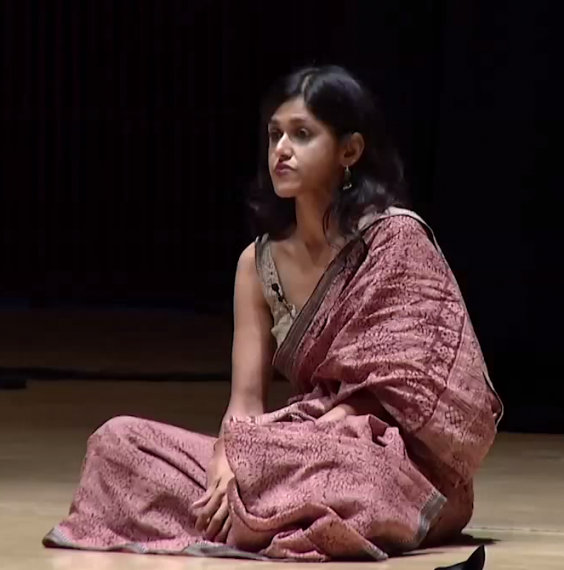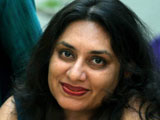Sehba Sarwar: A Voice That Breaks Boundaries
by Bina Shah / September 10, 2014 / No comments
VBB connects Houston to Karachi and incites social justice through art.

Photo via Youtube user: Tedx Talks.
When you think of a cultural organization, you might envision a place where artists can exhibit their work, discuss art, music, and literature, and engage with others in the artistic community. Yet sometimes, this world can feel closed to those who do not have a professional or personal connection to the literary realm. This often leads to warranted accusations that culture is the pastime of the elite and the affluent.

- Pakistan is a country of contradictions – full of promise for growth, modernity and progress, yet shrouded by political, social and cultural issues that undermine its quest for identity and integrity. My bi-monthly column “Pakistan Unveiled” presents stories that showcase the Pakistani struggle for freedom of expression, an end to censorship, and a more open and balanced society.

- Bina Shah is a Karachi-based journalist and fiction writer and has taught writing at the university level. She is the author of four novels and two collections of short stories. She is a columnist for two major English-language newspapers in Pakistan, The Dawn and The Express Tribune, and she has contributed to international newspapers including The Independent, The Guardian, and The International Herald Tribune. She is an alumnus of the International Writers Workshop (IWP 2011).
As a counter to this idea, a cultural organization in Houston is espousing a unique mission. The purpose of Voices Breaking Boundaries is “to cross borders, sustain dialogue and incite social justice through art.” Along with four other women writers/artists, the Pakistani writer Sehba Sarwar founded the organization in 2000. Over the past 14 years, VBB has grown from a grassroots literary collective into a thriving arts center. Using local and global connections to project the voices of artists as agents for both social change and expression, VBB’s work breaks every stereotype about snobby culture vultures, using.
The VBB team’s unstoppable energy is illustrated best in its leader’s physical presence. Sarwar is a petite, intense woman who wears her hair in a short dark bob. Her liquid eyes spark with electricity when she speaks about her organization. “Artists are the soul of society,” she asserts. This statement is the guiding principle in her work, a belief that’s manifested in her marriage of art and social change. Although Sarwar is based in Houston, with her husband René and her daughter Minal, she travels frequently to Karachi. These trips inform her desire to create artistic connections between both her cities.
“The organization started with a poem I wrote while I was still teaching, and I received personal funding to pay artists who participated,” says Sarwar. “Now the infrastructure has changed but VBB’s essence remains the same: to create art that challenges artists and audiences to experience the world through a different lens.” This message is visually portrayed in VBB’s logo: a world depicted upside down.
VBB provides space for music, visual art, and theater performances. The work must follow three guidelines: to involve youth, to be multidisciplinary, and to cross borders and sustain dialogue so that change can be “incited through art,” as Sarwar says in a short documentary about the organization. Over the years, VBB has held smaller, more intimate performances concerning local issues, such as queer and LGBT issues, the effects of Hurricane Ike or the Kashmir hurricane, and women’s rights. Marginalized Houston communities and students are always involved, and audiences participate in these performances, upholding the representative and democratic nature of VBB’s vision.
VBB has become best known for its expanded Living Room Art productions: a multidisciplinary series that explores issues in Houston and connects them to similar issues in South Asia. Homes become transformed through art installations, spoken and written word performances, visual art, theater, or music performances. The goal is to “create parallels” and uncover lost histories. The performances have to involve several key components: they must transform residential spaces in Houston, be free and open to the public, bring together diverse populations and communities, include people who don’t ordinarily go to art galleries or museums, and “tackle social justice through art.”
For example, a 2011 show called Third World: Third Ward, Karachi explored connections between a black neighborhood in Houston and alternative cultures in Karachi using storytelling, drumming, and films. The exhibition included an “art car,” created by Sarwar and another artist, decorated in the style of Pakistani truck art. The organization’s financing demonstrates that VBB’s artistic goals have national support as well as local popularity. VBB has received funding from the Andy Warhol Foundation for the Visual Arts, and annual funding from the National Endowment for the Arts and the City of Houston’s Arts Alliance, as well as other organizations.
But VBB isn’t just about performance or artwork. A visit to its website presents a dizzying array of activities and projects, a testament to its prominence in the Houston arts scene. Writing and teaching workshops, as well as the production of documentaries, short films, radio programs, keep VBB and its staff busy throughout the year. VBB recently began publishing books. Under its Living Room Art series, the organization has already produced two art catalogues: Women Under Siege and Homes and Histories. Two more are currently underway.
When I asked Sarwar what she has learned on her 15-year journey with VBB, she says, “Creating VBB has been like writing a long novel, creating and forging forward without knowing the ending. Since the organization continues, I can’t predict what will happen next. I know how to organize, to create art, to blaze a new trail that has no template, to carve space for myself and others who share my struggle of not belonging.”
She tells me about Borderlines, a long-term project that kicked off in 2013 and is planned to continue until at least 2016. Borderlines brings artists from South Asia and Houston and places their art in transformative exhibitions in various homes throughout the Houston neighborhoods of Near Northside and Gulfton. Through the lens of war and immigration, the project thematically connects the borders erected between the US and Mexico to those created between various South Asian countries, including Pakistan, India, Bangladesh, and Afghanistan.
Sarwar acknowledges that so far, the connection between Houston and Karachi has benefited Houston more than Karachi. “We can only do shows within the US,” Sarwar says. Funding is limited and there are restrictions on where the money can be used. However, Sarwar feels positive about her organizations reach: “I can say that the Houston audience that leaves our shows has a richer understanding of Karachi and Pakistan.” Though the Borderlines show will encompass work from artists based in Dhaka, Delhi, Kashmir, Toronto, Tijuana, as well as El Paso, the authentic experience will be confined within Houston’s borders. Although VBB’s interactive websites will give remote audiences a chance to view the exhibitions and performances, only those in Houston will be able to see it live.
In the past few years, Sarwar has devoted much of her time to publishing essays and creating art installations for others. Now she wants to find more time and space to concentrate on her personal art. Her novel, Black Wings, is based on her experiences growing up and living in Karachi. Currently, she is working on a memoir entitled What Is Home?, a project that’s received funding from the Mitchell Center for the Arts at the University of Houston and, most recently, the Mid-America Arts Alliance. She hopes to write a second novel soon.
“I cannot believe I’ve been running the organization and creating art productions for so long!” Sarwar exclaims. “[That] explains why I don’t have another book out.”
Nevertheless, Sarwar’s voice continues to ring out clear and true, breaking boundaries no matter what format she chooses to express herself in.




